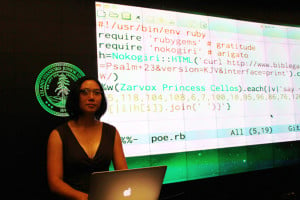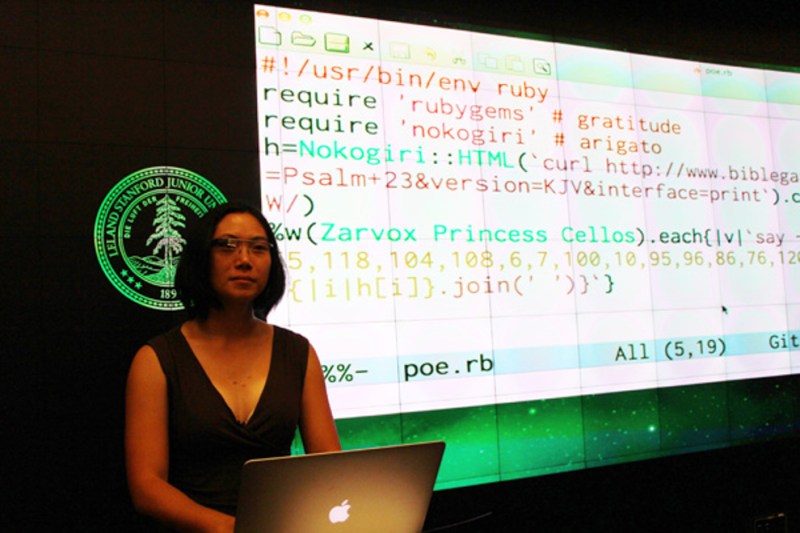
The fourth Code Poetry Slam, a competition that encourages poets and programmers to integrate the performance aspect of coding with more traditional notions of poetry, will be held this February.
Melissa Kagen, a German studies doctoral candidate, alongside Kurt James Werner, another Stanford graduate student, founded the Code Poetry Slam after being fascinated by how much of an art form computer code was and how computers were essentially “performing” code.
Code poetry combines elements of computer programming with the aesthetic qualities of poetry, which allows for leeway and creativity for poets, performers and programmers.
“People have done really wild, creative things,” Kagen said, who now organizes the Code Poetry slam. “It really depends on the poem.”
Submissions range from pieces of text with code-inflected idioms or coding structures to programs that generate poems. However, Kagen has also received submissions that are both independent poems and compilable, working code.
“Sometimes they’ve written [the poem] so that it reads rhythmically, and things rhyme a little bit,” Kagen said. “There are internal consonances, and when they perform it, it sounds like a beautiful piece of spoken text. We’ve also gotten beautiful pieces of video art. Sometimes people will read poems and have their programs compile at the same time.”
Even non-local submissions could be performed. For example, in the Code Poetry Slam 1.1 (Winter 2014), Keshav Dimri ‘14 performed Hunter Bacot’s poem “21st Century Prophecies,” in the poet’s stead, as Bacot lived in New York. Chatting over Skype, the two created a rough outline of the performance, and the poem later won the slam.
Instead of just reading the code word-for-word, Dimri delivered the code as if he were giving a sermon. For example, the line “the_medium = “twitter”” was read as “let the medium be Twitter.”
Dimri noted that by combining the tweets from luminaries such as Beyonce, the Pope, LeBron James and others, the code produced ideas that people could find profound.
“It felt like a prayer,” Dimri said. “I think he was trying to critique something about 21st century virtues. If you type all of [the code] in, you get a live output of tweets randomly meshed together. I thought it was cool because it is an allegory of what could be believed as religious faith, or some sort of received wisdom that wasn’t intended.”
Last year’s slam winner, Julian Bliss, a current computer engineering graduate student at Santa Clara University, used one piece of code that could be run in four different languages — C, Fortran, PHP, and Bash — to create different output messages. During his performance, he compiled his code in all four languages and ran them sequentially.
Running the code in C, PHP and Bash created English poems. For example, he rewrote William Carlos Williams’ poem “This is Just To Say” as the output for PHP, which included replacing the word “icebox” in the first line with “Xbox.”
However, Bliss had a different plan for the code in Fortran. He obfuscated the code so that it appeared to contain “hello, world.” When he ran the program, the program responded with “hi” as if it were about to begin conversing with the programmer.
Bliss still continues to write code poetry and has participated in other slams since. He notes that what interests him about code poetry is that it combines two seemingly distinct fields — poetry and computer science.
“One is trying to find beauty in how words ebb and flow, and the other is devoid of what most people call beauty and meant solely to portray structure or commands,” Bliss said. “That’s what programming is: just creating instructions for the computer to run and not meant to instill any emotions whatsoever. This clashing between finding a set of structure and aesthetic anything is quite interesting.”
This year’s poetry slam will take place Feb. 18, in Wallenberg Hall 124.
Contact Anne-Marie Hwang at amhwang ‘at’ stanford.edu.
